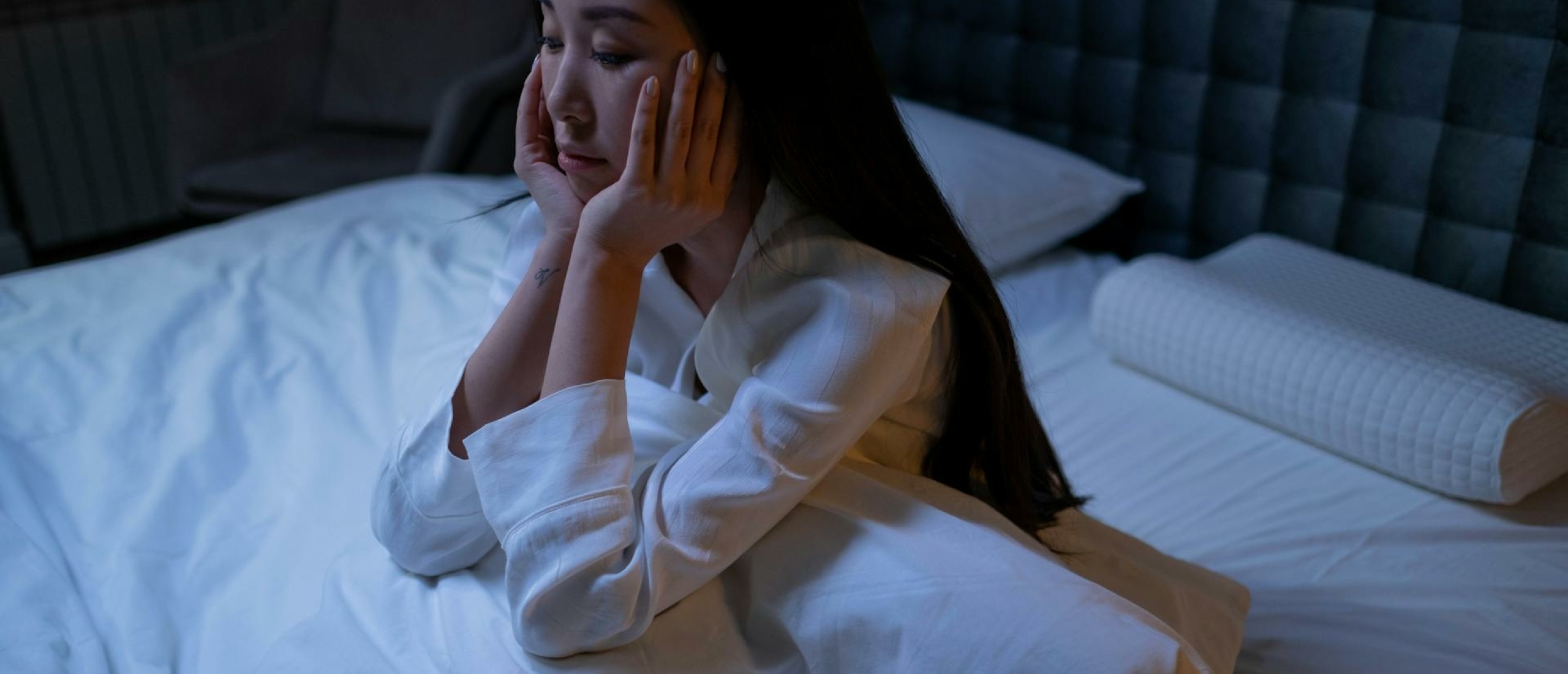
Stress and insomnia are deeply connected. When you’re stressed, your brain stays on alert, making it harder to fall asleep, stay asleep, or get deep, restorative rest. This ongoing state of “nighttime alertness” is one of the most common — and overlooked — effects of chronic stress.
Below, you’ll learn why stress so easily disrupts sleep, how the stress response interferes with your body’s nighttime systems, and the practical strategies that help you sleep better again.
Key Takeaways
- Stress activates the HPA axis, raising cortisol and keeping the brain in “wake mode,” even at night.
- Insomnia is a hyperarousal disorder, not just a problem of sleep quantity.
- Stress and insomnia reinforce each other, creating a cycle of fatigue, irritability, and impaired functioning.
- Sleep hygiene helps, but chronic stress-related insomnia usually requires deeper stress reduction.
- CBT, stress-management strategies, and medical guidance are the most effective long-term treatments.
The Vicious Cycle of Stress and Insomnia
Stress can trigger insomnia — and insomnia increases stress. Over time, this loop becomes self-reinforcing:
- You feel stressed → you sleep poorly
- You sleep poorly → you feel more stressed the next day
- Cortisol remains elevated → falling asleep becomes even harder
Breaking this cycle requires understanding how stress affects your brain and body at night.
What Is Insomnia?
Insomnia is one of the most common stress-related sleep disorders, affecting between 10% and 30% of adults. It’s defined as persistent difficulty:
- Falling asleep
- Staying asleep
- Or getting restful, quality sleep — despite having enough time and a proper sleep environment
Symptoms include:
- Fatigue
- Irritability (a classic stress symptom)
- Daytime sleepiness
- Difficulty concentrating
When insomnia symptoms occur at least three times per week for three months or longer, it's classified as chronic insomnia. Less frequent or shorter-duration symptoms are labeled short-term insomnia. Acute stress can trigger short-term insomnia, while chronic stress often contributes to chronic insomnia.
How Stress Disrupts Sleep
Work pressure, family issues, financial worries, or illness are all common stressors that disrupt sleep. But not everyone under stress develops insomnia. People more vulnerable often have lower self-esteem, fewer coping skills, or pre-existing anxiety disorders.
Insomnia increases daily stress levels, which in turn worsens sleep quality — a classic vicious cycle. This leads to:
- Low energy and fatigue
- Impaired memory and decision-making
- Social withdrawal
- Increased errors and accidents
The Science of Stress and Insomnia
When you’re stressed, the HPA axis (hypothalamus–pituitary–adrenal axis) becomes highly active.
- The hypothalamus releases CRF.
- CRF triggers the pituitary gland to release ACTH.
- ACTH stimulates the adrenal glands to release cortisol.
Cortisol is your daytime activation hormone. It keeps you alert, focused, and ready for action.
When stress persists:
- Cortisol stays elevated in the evening, when it should be low.
- Adrenaline and noradrenaline increase heart rate and internal tension.
- The brain stays in hyperarousal, unable to “switch off.”
Research shows that people with insomnia don’t just sleep poorly —
they remain physiologically overactivated around the clock.
This is why “just relaxing” at bedtime rarely works.
What Helps: Treatment Strategies for Stress-Related Insomnia
Not all insomnia is caused by stress, but when the two are connected, these strategies are most effective.
1. Build Strong Sleep Hygiene (the foundation)
Sleep hygiene alone won’t fix chronic insomnia, but it improves the conditions for sleep:
- Keep a consistent sleep schedule
- Go to bed only when genuinely sleepy
- Limit caffeine, alcohol, nicotine after mid-afternoon
- Avoid screens before bed — reduce blue light + cognitive stimulation
- Keep your room dark, cool, and quiet
- Create a short wind-down ritual (reading, stretching, warm shower)
- Get morning sunlight to stabilise your circadian rhythm
These habits reduce unnecessary barriers so deeper interventions can work.
2. Reduce Stress During the Day, Not Only at Night
A crucial mistake many people make:
They try to relax only at bedtime.
But chronic stress creates day-long hyperarousal, meaning nighttime relaxation has little effect unless daytime stress is also addressed.
Effective daytime strategies include:
- Micro-breaks
- Breathing techniques
- Setting clearer boundaries
- Improving workload control
- Tackling sources of uncertainty or overload
- Communication strategies and support-seeking
You need to calm the body earlier in the day to sleep well at night.
3. Consider Professional Support
A doctor, psychologist, or psychiatrist can help:
- Identify whether stress, anxiety, or depression are contributing
- Evaluate medical causes of insomnia
- Provide personalised stress-reduction strategies
- Monitor for conditions like hyperarousal or cortisol dysregulation
This is especially important if insomnia has lasted several months.
4. Cognitive Behavioral Therapy (CBT-I)
CBT-I is one of the most effective treatments for chronic insomnia.
It helps you:
- Change unhelpful thought patterns around sleep
- Reduce anticipatory anxiety (“What if I can’t sleep again?”)
- Rebuild sleep pressure naturally
- Break the cycle of hyperarousal
It also improves stress resilience, making it ideal when stress and insomnia are intertwined.
5. Be Cautious With Medication
Some sleep medications and antidepressants can help temporarily, but they:
- Often don’t address the root cause (stress)
- Can carry side effects
- May worsen sleep architecture over time
- Require careful monitoring in older adults
Medication is sometimes useful — but rarely the first or best long-term solution.
How to Start Sleeping Better
Stress and insomnia are deeply linked, but the cycle is not permanent.
Begin by improving sleep hygiene, but also address the daytime stressors keeping your system in “alert mode.”
To explore stress management in more depth, visit our articles at StressInsight or join our program Surmounting Stress, where we teach science-based strategies to calm the stress response and rebuild healthy sleep regulation.
FAQs
Can stress really cause insomnia?
Yes. When you’re under stress, your brain activates the hypothalamus–pituitary–adrenal (HPA) axis, which releases cortisol and other stress hormones that keep you alert. Elevated evening cortisol levels make it harder to fall asleep or stay asleep, leading to insomnia if stress persists.
What’s the difference between short-term and chronic insomnia?
Short-term insomnia lasts a few days or weeks and is usually triggered by an acute stressor, such as work pressure or a personal event. Chronic insomnia continues for three months or more and often involves ongoing stress, anxiety, or physiological hyperarousal that doesn’t subside at night.
What are the best ways to improve sleep when stress is the cause?
Start by addressing both sides of the problem — stress and sleep habits. Practice regular relaxation techniques like deep breathing or mindfulness, maintain a consistent bedtime routine, limit caffeine and screen exposure in the evening, and create a cool, dark sleeping environment. If insomnia continues, cognitive behavioral therapy (CBT) or consultation with a healthcare professional is recommended.
Disclaimer: This information is educational and not a substitute for medical advice. If insomnia persists, consult a qualified health professional.











